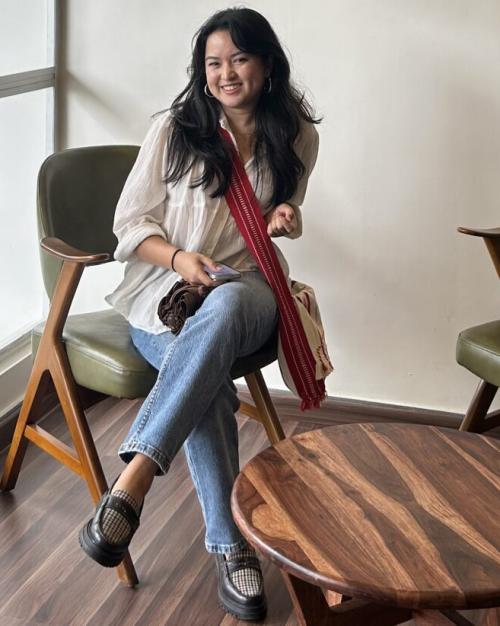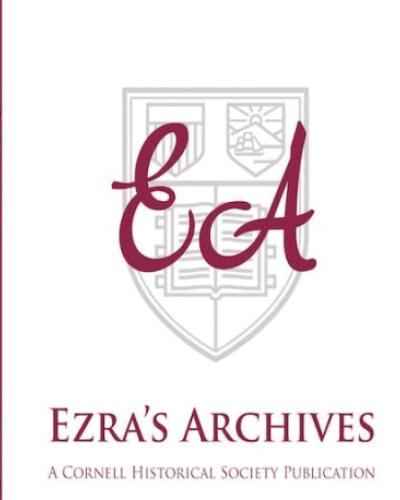In the middle of March, halfway through their second-semester, seniors Regan Murray and Max Fernandez, co-editors-in-chief of Ezra’s Archives (an undergraduate peer-reviewed history journal) had to move their work off-campus to the internet. The COVID-19 pandemic altered everything, including the activities of the Department of History’s student group, the Cornell Historical Society (CHS), which publishes the journal. CHS promotes history through four key activities: the History Advisor Program (peer advising), Ezra's Archives, community engagement events (movies and faculty dinners), and a speaker series.
Department staff interviewed Max and Regan via zoom on May 13 to find out how the pandemic has affected their work on Ezra’s Archives. When NY went on pause, the Ezra’s Archives' editorial team of 20 students did too, they said. At that point, they had already selected five journal articles from 40 submissions. “Submissions this year were very high-quality and came from a number of universities across the United States, and we were especially happy to have received our first international submission,” Max said.
With the essays selected, the editorial staff was ready to begin checking the articles for substance, clarity, prose, and grammar and then correspond with authors. But the virus and Cornell’s move to remote instruction forced them to pause.
"Suddenly, we were all coping with many emotions," Regan said. "Seniors and juniors were saying goodbyes, CHS and Cornell traditions were postponed. It was very emotional."
Once settled in their new situations, students needed time to “adjust to the new normal,” and this led to an editorial slow down.
Challenges awaited the team once they returned to work on the publication, although some parts of the process stayed the same. “Much of the editorial work was remote with emails back and forth between editors and authors,” Max said.
The co-editors-in-chief agreed that the group missed face-to-face collaborative meetings with their peers. Frequent face-to-face meetings of the editorial board built camaraderie within the group. They also increased accountability, which Regan noted is "harder remotely than face-to-face. When you know you have to look someone in the eye at a meeting, there is an enhanced sense of responsibility."
At the same time, Max said that a positive emerged: "The copywriting staff did a very good job and developed a more sequential and efficient process for moving the essays forward."
Both editors said that conflict management was not a problem, even working remotely. Since the editorial group knew each other going into sheltering in place, trust was established. When conflict emerged, Max's direct style was to "pick up the phone and call people,” when he had questions or concerns or needed to intervene in possible conflicts.
Regarding communication, Regan said that authors are “Trusting us with their word babies, and we have to respect that.” She knows about this trust. One of her essays was accepted by her peers to be published in the journal.
“We have to be diplomatic with our authors as we are not only establishing relationships with them, but good trusting relationships will encourage their peers to submit to us in the future," Max added.
The editors’ leadership style is to put the relationship between editors and authors first. “When you ask an author to do another round of revisions, you have to be conscientious and sympathetic. We have to understand that we are asking authors to do a lot of extra work on top of their regular academic and personal commitments in a particularly challenging environment.”
When asked what new skills were developed due to the switch to online learning, Regan reflected what many students may be feeling: “The impact is that we have to make communication more of a priority. Before moving entirely online, the flow was much easier when going to campus as I would run into people and then talk about editorial matters. It was an adjustment to rebuild this lost structure into something new."
"And more importantly," Regan continued, “the experience helped me and others to re-evaluate why we are doing Ezra’s Archives."
It renewed their commitment. “For me, it seems so much has been canceled and postponed that the Archives was something concrete to hold on to through the worldwide pandemic crisis, Regan said. “A symbol of completion and continuity despite a drastic change and a way for the tradition to continue. It is also a way to keep the younger students engaged with CHS."
"What else can you tell us about completing this journal under NY’s pause?"
Max replied, “I was co-editor-in-chief of Ezra’s Archives last year, and I have worked with the journal in various capacities over all four years of my time at Cornell. Going into this year I was really happy to get a chance to help produce another edition of the journal – I knew my editors, I knew the challenges involved, and I had a variety of ideas about how we could improve the editorial process. But, as the year progressed, we were thrown a variety of new challenges, including COVID-19, and we ended up producing the journal under very different circumstances than those I envisioned. This has been a challenge, but it has also been a reminder of the hard work and Ezra’s Archives’ editors, authors, and the Cornell community at large.”
This 10th edition of Ezra’s Archives is in its last production stages and will soon be available on the history department website. Hard copies will follow in the fall, even if in a limited run for authors and members of CHS. We wish Max and Regan, the editors, and the essay authors, all the best. Their contributions to the world have begun on a strong note as they carry forward a historical tradition in the Department of History. Our virtual hats are off to them, and we look forward to meeting up with them again at graduation.





